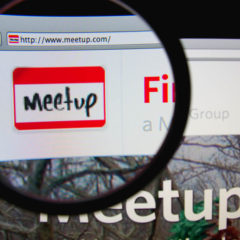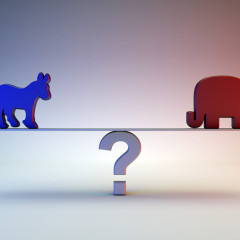Facebook doesn’t tell you really why you get targeted advertising
In the data world, the topics of transparency, privacy and ethics are more and more discussed. As we predicted a year ago, this may well be the next revolution in data science. We ran an experiment to understand the level of information Facebook users get on targeted advertising. Data literacy is essential Educating people on the role of data in their lives is essential. We see too many companies which revamp their terms and conditions and...
GDPR : what does data portability really mean ?
The General Data Protection Regulation (GDPR) enforces the concept of data portability. What it means remains however opaque for most of us as the concept behind data portability can’t be easily applied and doesn’t really correspond to any expressed or latent consumer’s needs. Portability : a game changer for many industries, pushed by the European Commission The concept of portability is at the heart of the action of the European Commission for the defense of consumers’...
New Twitter conditions give you a glimpse into how and which personal data collected
On 20 May 2017 Twitter sent an email to its users announcing that new terms and conditions apply. These changes largely apply to data usage, personalization and targeted advertising. One can’t really say it’s a revolution, but at least it’s a first step towards more transparency (something much needed in the field of Big Data). And the new privacy parameters give you an idea of how the personalization algorithms of twitter work and which kind of...
Personalized car insurance has unexpected effects on customers behaviors
A recent article in a French magazine sheds light on progresses made by insurance company Allianz in the field of personalized car insurance. Like many other firms in the field, Allianz believes in the usefulness of telematic units (black boxes) to monitor drivers’ behaviors and better evaluate risks. 20000 customers of Allianz have already opted in France; a rather small number that reflects the risks perceived by customers (as for instance on the Norwegian market) Is...
Youtube recommendations : user experience and algorithmes better than ever
If you are addicated to YouTube, chances are high their recommendation systems play an important role in your addiction. Our deep interest in recommendation engines and algorithms makes us naturally gravitate towards the YouTube app to assess their latest developments. And the least we can say is that the latest version of their recommendation algorithm is extremely good and likely to trigger addiction among users. How YouTube recommendations work YouTube has considerably improved its app and...
Market research : data strategy for European broadcasting organizations
On the occasion of the 2nd annual EBU Big Data week held in Geneva on 21 and 22 March 2017, the results of a pilot survey on the state of Big Data among broadcasters was revealed. The survey results are based on answers from 33 broadcasting organizations. Here are the key results to be remembered : 2/3 of surveyed members say data is important or very important for their organizations only 1/3 say Big Data is...
Recommendation algorithms : the myth of filter bubbles at stake
We’ve already discussed filter bubbles on this blog, a rather technical term that describes the negative effet of algorithms on our digital life. For more information read this thorough article. Whether or not filter bubbles really exist is still debated and I wanted to compile all scientific results on the subject. There are actually very few of them/ Although Pariser (2011) has claimed the obvious existence of filter bubbles, contradictory results have been obtained. Interestingly Anderson...
Artificial intelligence: are algorithms biased by nature ?
I attended a workshop at the Maastricht European Centre on Privacy and Cybersecurity where I met Prof. Alessandro Mantelero of Polytecnico di Torino. Prof. Mantelero is well known as a specialist in the protection of personal data, which has become a very important topic with GDPR. In his talk he was discussing among other things the biases of algorithms and highlighted the need to avoid them. Using examples from the insurance sector (smart boxes) and from...
GDPR compliance: are your algorithms ethical?
On your journey to GDPR compliance (General Data Protection Regulation) you will certainly need some help and some guidance to do the right things avoid being fined. We all agree, among specialists, that GDPR implementation may be delayed to let companies adapt. Recent market research discussed at CPDP conference revealed indeed that only 4% of companies were currently getting ready for GDPR. This being said, don’t expect getting a long period of grace. You better start...
Emotions detection in advertising: consumers still reluctant to give their data
Advertisers have always been among the most creative professionals; not only on the content part but also in their use of the newest technologies to make their advertising messages more efficient. The use of eye-tracking dates back to decades, whereas billboards on streets can nowadays be equipped with technologies (sensors) to interact with pedestrians. M&C Saatchi partnered with Clear Channel and Posterscope to launch an artificial intelligence-powered poster campaign. This campaign is not new (July 2015)...
Market research : Norwegians don’t want personnalized insurance
Insurance companies are getting increasingly personal and thanks to digitization they are proposing new tailor-made products. Two main applications can be found : Personalized health insurance Personalized car insurance We have explored in recent articles the different aspects of such insurances (see for instance our article on black boxes in cars, or this article on the dangers of personalized health insurances) but hadn’t reported yet on market research results regarding consumers’ expectations in this matter. It...
Can Big Data become a technique to promote transparency and equity
On this blog I often took a pessimistic look at Big Data, asking for a revolution in how firms build and use their algorithms. I called for instance for opening up the models behind recommendation algorithms and wondered whether our freedom was at stake. Today’s article will be definitely more optimistic because I met last week at the CPDP 2017 conference two speakers that delivered brilliant presentations on how Big Data can actually become a tool...
How data vulnerability affects firms’ performance and how to remedy it
Everyone talks about privacy. But what is it really ? A recent article in French economical journal “La Tribune” built upon two recent BCG reports (here and there) on data protection and privacy to question firms’ practices around data privacy 62% of French people surveyed by BCG said companies don’t respect the private character of their data. Yet, what is privacy ? Most people will claim they know but once you scratch the surface you quickly...
Academic research debunks the myth of filter bubbles
The interest for the “Filter Bubble” phenomenon reached an all-time high after 2016 US presidential elections (see our article). The existence of filter bubble was hypothesized by Eli Pariser in 2011, yet it remains at the center of debate on his actual existence. According to Pariser the algorithms implemented to make our digital lives easier are an impediment to serendipity. According to opponents the Internet offers a limitless range of resources which increase the potential for...
How US elections shed light on the filter bubble phenomenon
Just do a Google search on “Filter bubble” and you’ll be surprized of the many results returned. The recent US presidential elections have shed light on this phenomenon first hypothetized by Eli Pariser in 2011, and subject to much debate (see also our upcoming article on 18 Jan 2017). Yet the facts are there. Right after the elections of 08 November 2016, the interest for “filter bubble” increased fourfold (see picture below). Interestingly a second surge...
Customer satisfaction, customer experience and big data
Improving customer experience is priority #1 of top executives for the next 12 months (Lemon and Verhoef 2016). At the same time Big Data is on every serious company’s agenda. How can Big Data contribute to creating a customer experience that will ensure customer retention ? This is the topic of today’s article where we will question the usefulness of Big Data in today’s digital sphere (yes ! we’ll dare doing that !). What is customer...
The role of Big Data on society : EBU conference
With fellow colleagues of EBU, I organized last week a conference entitled “Big Data and Society“at RTBF, the French-speaking public broadcasting organization of Belgium. As I wrote on EBU website, this event aimed at gathering together professionals from the broadcasting industry to reflect on the impact of Big Data, recommendation algorithms and filter bubbles on society in general, and on users’ behaviors in particular. We assembled an amazing panel of 8 speakers from 5 countries who shared...
Amazon Go : this disruptive retail model hides a secret
Amazon Go is a 100% connected store where checkout are automated. Amazon Go is the convergence of at least 3 important trends : the first one is the diversification of Amazon into brick-and-mortar store the second one is a trend to decrease costs in the retail sector to increase margins the third one is the dream to put all behaviors into data to better predict what consumers will buy next Trend #1 : Amazon’s diversification into...
How novelty and serendipity improve customer satisfaction
Product recommendations have enabled E-commerce websites to become a place where mass marketing converges with niche marketing. Recommendations are pivotal in enabling less popular products to be discovered by people who are the most likely to like them : this is a long-tail strategy. There is however a dilemma to be adressed : how much of novel and unexpected products should be recommended to online visitors to enhance their satisfaction? This is the purpose of today’s...
Are we living in the matrix ?
Are we already living in the matrix ? That question may seem odd to most of you. Not to some unidentified silicon valley billionaires who are secretly funding scientists to find a way to escape the matrix. I’ve been thinking a lot about freedom and algorithms for a few months now, and would like to share some of my thoughts with you. Background : what was the matrix about ? Let’s remember what the Matrix movie...
Vitality offers Apple watch to monitor your activity : one more insurance into big (health) data
A few weeks ago we were discussing on this blog the trend of the insurance market to collect very intrusive data. I had the opportunity to raise my concerns at several conferences and got the impression that people were not aware of what was going on (especially as far as car insurances are concerned). In particular I gave the example of CSS Insurance in Switzerland which proposed customers to wear a fit band capturing activity data...
Artificial Intelligence : why we need respectful algorithms
Developments of artificial intelligence are a source of concern for several reasons. First of all AI threatens jobs, privacy and our perceived freedom. Second, 99,99% of the population doesn’t really understand what AI is and where it originates. In today’s post I’d like to raise the case of respectful Artificial Intelligence and explain why we need the way we conceive “intelligent” algorithms. Why do we need respectful artificial intelligence and privacy laws ? Technology should be...
Big Data : 4 types of filter bubbles
The question of the existence of filter bubbles (also called cognitive bubbles) is central to the fields of Big Data and algorithm design. Among different books, I was very much influenced by the Dominique Cardon’s book on algorithms and society. In this book entitled “What are algorithms dreaming of ?” Cardon proposes a framework based on four types of web measurements, each resting on a specified data type (see summary table below). Examples Data Population...
Big Data and Ethics : how recommendations work at Meetup.com
There have been many interesting talks at the RecSys 2016 conference in Boston. Yet, the presentation given by Evan Estola of Meetup was especially inspiring to me. It wasn’t the regular technical speech you may expect in that kind of conference (although Evan is himself a rather technical guy); rather it gave the audience a perspective and a vision on how ethics and Big Data can (and need to) be combined. Evan started by giving examples...
Big Data : why ethics issues need to be addressed urgently
Artificial Intelligence is increasingly present in our daily lives : speech recognition, automatic translation, personal assistants, chatbots, recommendation algorithms. These technological advances are also subject to criticism and questions on ethics. What happens with our data, will algorithms govern us, what about the concept of freedom ? There is work to be done to teach people the positive and negative sides of AI and even more work to make them conscious about alternatives. Is this a...
Predicting consumers’ behaviors: the importance of explicit feedback
In today’s article I’d like to present a new perspective on the evolution of consumer behaviors’ modelization in the last 30 years or so. These modelizations are windely used in today’s world of Big Data and recommendation algorithms. Introduction Understanding consumer behavior is not a recent quest. Modelizing behaviors has long been a priority for market researchers, academics and practitioners. In the 70’s (and before) social science was in charge of defining standard profiles to understand...
RecSys 2016 conference : trends in recommendation on TV
The ACM Recommender Systems conference opened on 15 September 2016 in Boston (MA) with the RecSys TV workshop, one day dedicated to recommender systems in the broadcasting sphere. Presentations by Verizon, Comcast, Netflix, the University of Lisbon were the highlights of the day. Diana Hu (Verizon) showed how time-series can be used to predict users’ preferences. An interesting decomposition in genres showed very recurrent patterns throughout the week. This, added to other recurring patterns on longer...
My summer readings : the outstanding, the good and the worse
Summer is usually the time for me to rejuvenate my creativity and get prepared for the second part of the year to come. I love to chain-read to encourage ideation. This year I packed my beloved Kindle with a few books. Some of them inspired me, others didn’t. Here’s my commented summer reading list. As you’ll see it’s very much Big data oriented. Eli Pariser: “the Filter Bubble” I discovered the book by Eli Pariser only...
Why you should not wear health devices
So far insurances had to rely on your declarative questionnaires to evaluate the risk you represented. Those have been found to be very intrusive; so intrusive in fact that Belgian consumers’ defense organization Test Achats has urged insurance companies to change those questionnaires (link in French). This evaluation was made at the time you subscribed the insurance and was likely not to be revised afterwards. Insurances had to predict your risk for the x coming years...
Users change their behaviors to please algorithms
Technology and especially algorithms have invaded the public space. According to Alain Damasio “Freedom is not a desirable concept anymore”. Security and ease-of-use now comes first, as the success of recommendation engines tends to prove. We are surrounded by computer code suggesting choices and taking decisions for us : from Google search box making suggestions to Netflix’ recommendation engine, through Facebook EdgeRange algorithm. Those algorithms do help us for sure. The amount of possibilities surrounding us...
Facebook : how do people perceive NewsFeed curation algorithm
Curation algorithms aren’t fundamentally different from recommendation engines (see the article we just published on the latter here). They select what you ought to see, for instance on your Facebook Newsfeeds. Two studies have addressed customers’ perception of automated curation : Rader and Gray (2015) and Eslami et al. (2015). Here are how users perceive Facebook NewsFeed’s algorithm. Are people aware of the existence of NewsFeed curation algorithm? The first striking fact is that most people...
Recommendation algorithms : how big is the Filter Bubble in actuality
Recommendation algorithms have been accused to trap users in a filter bubble, to promote the balkanization of information and hence to reduce serependity. The biggest opponent of recommendation engine is probably Eli Pariser who invented the very term of “filter bubble”. Despite very convincing arguments in his 2011 book, Pariser somewhat failed at backing his theory with figures (which is perfectly understandable given the novelty of this topic back in 2011). What we propose to do...
Big Data: let your customers improve your segmentation
Companies are keen on obtaining as much data as possible on their customers to improve behavioral profiling. Yet, few companies harness the power of their customers to enrich their data with new types of data, allowing new segments to be created. In today’s article we’d like give you two examples of how online journals are using their customers to categorize their articles differently and improve recommendations. Like and dislike: the most basic type of segmentation Like...
1 month using TOR : it ain’t easy to protect his privacy
Those of you who watched Ed Snowden’s movie “Citizen Four” are certainly aware of privacy issues that come with the use of the Internet. Privacy was first a value of the internet and progressively became a myth. The initial libertarian dream has turned into a total control nightmare, not far away from Orwell’s “1984” vision. All your online actions are being tracked. With that in mind I decided to remove Chrome and Firefox and to use...
Let’s reinvent recommendation engines
Recommendation engines (a series of algorithms aiming at targeting what you’d like best to see / get / purchase / you name it) are everywhere. You use them without knowing it. The first recommendation engine is actually Google (or any search engine) that aims at recommending you the most relevant content for you among millions (if not billions) of possible pages. Those recommendation algorithms make choices for you and exclude de facto content that would be...
Liberals share less serious content on Facebook than conservatives
In my quest to understand how algorithms limit our freedom, my attention was caught by a piece of research published in June 2015 in Science. This research was funded by Facebook (which is an important piece of information) and aims at understanding whether Facebook’s News Feed selection algorithm limits the diversity of the information we consume on Facebook. The authors conclude that Facebook’s algorithm(s) actually expose us to more diverse opinions and contents than our natural...



































